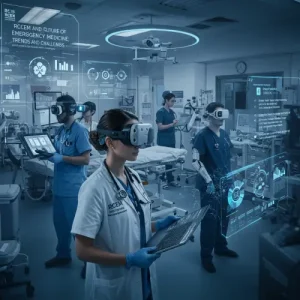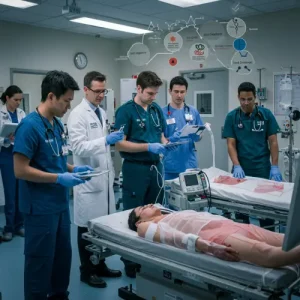Continuous Professional Development (CPD) is a cornerstone of medical practice, ensuring that healthcare professionals maintain their skills, knowledge, and competencies to provide the best care possible to patients. For emergency medicine professionals, this is especially critical, given the fast-paced and ever-evolving nature of the field.
The Royal College of Emergency Medicine (RCEM) offers a comprehensive range of CPD programs designed to enhance the skills of emergency care providers at every stage of their careers. RCEM’s CPD initiatives not only focus on improving clinical expertise but also contribute to personal growth, leadership development, and an overall improvement in the delivery of emergency care across the UK.
In this blog, we’ll explore how RCEM’s CPD programs are shaping the professional development of emergency medicine professionals, why they are essential for career progression, and the lasting impact they have on both clinicians and patient care.
1. A Focus on Lifelong Learning
In emergency medicine, the landscape of patient care is constantly changing, from advancements in medical research and technology to evolving healthcare policies and practices. To remain effective and competent, emergency medicine professionals need to commit to lifelong learning. RCEM’s CPD programs are designed to support this ongoing education by providing opportunities for clinicians to engage with new evidence, tools, and techniques.
RCEM ensures that their CPD programs are aligned with the needs of the profession. This means that clinicians can stay updated with the latest evidence-based practices, learn about emerging trends in emergency care, and develop skills that help them respond to the evolving challenges of their work environments.
Whether through workshops, seminars, online modules, or specialized courses, RCEM’s CPD programs give emergency medicine professionals the tools they need to stay ahead in a constantly evolving field.
2. Encouraging Reflective Practice
One of the core principles of RCEM’s CPD programs is the emphasis on reflective practice. Reflective practice encourages clinicians to regularly assess and reflect on their experiences in the workplace, identifying strengths and areas for improvement. This self-awareness not only promotes professional growth but also ensures the delivery of high-quality care.
RCEM’s CPD initiatives often include activities that encourage practitioners to reflect on their clinical decision-making, communication with patients and colleagues, and overall practice. For example, emergency department staff can use CPD opportunities to engage in case discussions, review clinical outcomes, and assess their response to high-pressure situations.
This practice of self-evaluation and reflection is essential for emergency medicine professionals, as it helps them continually assess their approach to patient care and adapt to new challenges and situations.
3. Supporting Specialization and Career Progression
RCEM’s CPD programs also play a critical role in supporting career progression. For those looking to specialize in areas such as pediatric emergency care, trauma, or critical care, CPD offers the necessary tools to gain specialized knowledge and skills. By completing advanced CPD courses and qualifications, emergency medicine professionals can elevate their expertise and take on roles with greater responsibility.
Additionally, CPD helps emergency medicine professionals prepare for higher-level leadership and management roles within their departments or healthcare organizations. RCEM’s programs often include leadership training, management workshops, and development resources that help clinicians hone their decision-making, team management, and organizational skills—critical competencies for career advancement in the field of emergency medicine.
RCEM’s commitment to offering tailored CPD pathways ensures that professionals at all stages of their career can find learning opportunities that match their aspirations.
4. Enhancing Clinical Competence and Patient Safety
The ultimate goal of CPD in emergency medicine is to improve patient care and safety. RCEM’s CPD programs are grounded in evidence-based medicine and best practices, providing clinicians with the tools to manage complex cases and high-stress situations effectively. By focusing on areas such as clinical protocols, patient safety, and emergency procedures, RCEM helps ensure that clinicians can confidently apply the latest research and techniques in their day-to-day practice.
In an environment as fast-paced and high-pressure as the emergency department, staying up to date with clinical guidelines, new procedures, and emerging health issues is vital. CPD allows professionals to refresh their knowledge, improve clinical decision-making, and develop new strategies to handle emergency situations, all of which contribute to improved patient outcomes and a safer healthcare environment.
5. Facilitating Interdisciplinary Collaboration
Emergency care is inherently multidisciplinary, with collaboration between doctors, nurses, paramedics, technicians, and other healthcare professionals being essential for providing the best care. RCEM’s CPD programs help foster interdisciplinary learning, which encourages collaboration and communication among different healthcare teams.
RCEM organizes multidisciplinary workshops and events where professionals from various backgrounds can come together to share experiences, learn from one another, and improve their collective skills. This is especially valuable in emergency medicine, where coordinated care between different specialties is crucial for ensuring that patients receive comprehensive and effective treatment.
Through CPD, RCEM is enhancing teamwork in emergency departments, helping to break down barriers between disciplines, and fostering a culture of collaborative care.
6. Access to a Wide Range of Learning Formats
RCEM recognizes that different professionals have different learning preferences and needs. To accommodate this, RCEM offers a variety of learning formats within their CPD programs. Whether you prefer in-person events, live online courses, or self-paced e-learning, RCEM ensures that there are flexible options available to suit busy schedules and diverse learning styles.
For example, RCEM’s e-learning modules provide accessible learning opportunities that professionals can complete at their own pace, making it easier for them to fit CPD into their busy work schedules. On the other hand, face-to-face workshops and conferences offer opportunities for in-depth discussions, networking, and practical skill-building in a collaborative environment.
By offering multiple formats, RCEM ensures that all professionals can participate in meaningful and enriching CPD activities, no matter their individual preferences or constraints.
7. Recognizing and Accrediting Achievements
One of the key benefits of RCEM’s CPD programs is the recognition and accreditation of achievements. RCEM provides a structured framework for clinicians to log their CPD activities, ensuring that their learning is documented and aligned with professional standards. This system of accreditation adds value to the CPD process by formally acknowledging the clinician’s commitment to their professional development.
Having accredited CPD hours and achievements is important not only for personal growth but also for meeting regulatory requirements and advancing within the healthcare system. It provides tangible evidence of a clinician’s ongoing commitment to learning and improving their practice.
Conclusion
RCEM’s CPD programs are integral to the professional development of emergency medicine practitioners, offering a comprehensive approach to continuous learning and career advancement. By focusing on reflective practice, specialization, leadership development, clinical competence, and interdisciplinary collaboration, these programs equip emergency medicine professionals with the knowledge and skills they need to navigate an ever-evolving healthcare landscape.
As the field of emergency medicine continues to face new challenges, RCEM’s CPD programs will remain essential in ensuring that clinicians are not only meeting the current demands of the profession but are also prepared to lead and innovate in the future. By investing in professional development today, emergency medicine professionals can shape the future of patient care and elevate the standard of care across the emergency medicine sector.




